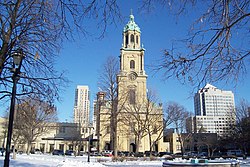Cathedral of St. John the Evangelist (Milwaukee)
|
St. John's Roman Catholic Cathedral
|
|

Cathedral of St. John the Evangelist
|
|
| Location | 812 N. Jackson St. Milwaukee, Wisconsin |
|---|---|
| Nearest city | Milwaukee, Wisconsin |
| Coordinates | 43°2′30.43″N 87°54′14.88″W / 43.0417861°N 87.9041333°WCoordinates: 43°2′30.43″N 87°54′14.88″W / 43.0417861°N 87.9041333°W |
| Built | 1847 |
| Architect | Victor Schulte |
| NRHP reference # | 74000108 |
| Added to NRHP | December 31, 1974 |
The Cathedral of St. John the Evangelist is the episcopal see of the Catholic Archdiocese of Milwaukee in Milwaukee, Wisconsin. It is listed on the National Register of Historic Places and designated a Milwaukee Landmark. It is located just east of Cathedral Square Park.
Archbishop John Henni purchased land for the cathedral in 1844. The cornerstone was laid on December 5, 1847, after nearly $30,000 was raised for construction. It was completed in 1852 and dedicated to John the Evangelist. The building was designed by architect Victor Schulte in the nineteenth-century Zopfstil style and built using Cream City brick, a distinct light colored brick found locally.
The original tower was deemed unsafe and the section above the clock was replaced with a taller tower in 1893, which was designed by noted Milwaukee architects George Ferry & Alfred Clas. A fire partially destroyed the church and most of its contents in January 1935. Only the tower remained fully intact. Rebuilding was completed in time for midnight mass on Christmas Eve of 1942.
St. John's Cathedral features thirteen large hand-cut stained glass windows made by T.C. Esser Company of Milwaukee. A large tomb-shaped baptismal pool and marble font is also situated prominently in the center of the sanctuary. In 2001 a gated garden and atrium were added at the north end of the building.
The Cathedral of St. John the Evangelist celebrated its 150th anniversary in 1997.
It was rededicated on February 9, 2002, following a controversial renovation project which consisted of some restoration work on the historic structure but also a radical remodeling of the interior. There was a very vocal anti-renovation group who petitioned the Vatican for a halt to the renovation. Archbishop Rembert Weakland, was the primary advocate of the renovation which he and supporters felt brought the cathedral into a more modern "post-conciliar" style. Weakland hired liturgical consultant Richard S. Vosko to plan the renovation. Among the most controversial elements of the renovation was the dismantling of the historic High Altar and Baldacchino in the apse which were replaced with organ pipes. The sanctuary and altar was then moved forward into the nave and crowned with a fiberglass crucifix designed by Italian sculptors Arnaldo Pomodoro and Giuseppe Maraniell. The piece is topped with a crown of thorns, fourteen feet in diameter, which hovers over the figure of Christ.
...
Wikipedia
